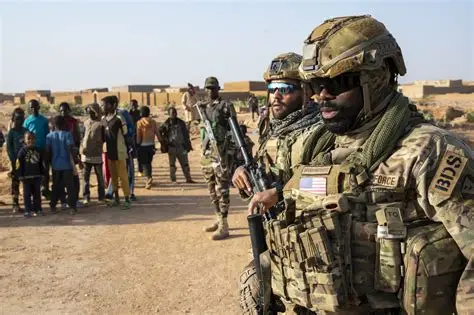- Safiu Kehinde
The United States military has reportedly unveiled plans for potential airstrikes in Nigeria over alleged Christian genocide in the country.
This is coming under the heels of President Donald Trump’s directive instructing the Pentagon to “prepare to intervene” to protect Christians from terrorist attacks.
As disclosed in a report, released on Wednesday by The New York Times, the U.S. Africa Command had submitted a series of operational options to the Department of Defense in response to a request from Secretary Pete Hegseth to develop plans consistent with Trump’s orders.
Officials familiar with the planning told The New York Times that the proposals, described as “heavy,” “medium,” and “light,” detail different levels of military engagement within Nigeria.
The light option, according to the officials, included what the military called partner-enabled operations.
Under that option, the U.S. military and the State Department would support government forces in Nigeria to target Boko Haram and other Islamic insurgents who have attacked, kidnapped and murdered civilians, mostly in northern Nigeria, where sectarian and ethnic violence has raged for almost 20 years.
However, the United States would have to conduct these operations without the expertise of the U.S. Agency for International Development, whose office in Abuja was officially closed in July after the Trump administration shuttered the agency.
The “heavy” option would involve deploying an aircraft carrier strike group to the Gulf of Guinea, accompanied by fighter jets or long-range bombers capable of striking militant targets deep in northern Nigeria.
On the other hand, the medium option being put forward by Africa Command, officials said, includes drone strikes on militant camps, bases, convoys and vehicles in northern Nigeria.
American Predator and Reaper drones are planned to loiter for hours before striking.
This is expected to enable the U.S. intelligence to gather information on specific targets’ pattern of life.
The heavy option, military officials said, would be to move an aircraft carrier group into the Gulf of Guinea and to deploy fighters and perhaps long-range bombers to conduct strikes deep in northern Nigeria.
But the United States is already in the process of moving one of its aircraft carriers, the Gerald R. Ford, from its deployment in Europe to the southern Caribbean, where Mr. Trump has declared war on drug cartels.
Other aircraft carriers are currently deployed in the Pacific or in the Middle East or are undergoing maintenance.
Meanwhile, Senior Pentagon officials reportedly acknowledge that limited airstrikes or drone operations are unlikely to end Nigeria’s protracted insurgency.
They held that the best option for the U.S. is to undertake a full-scale campaign similar to those in Iraq or Afghanistan—an approach Washington is not currently pursuing.


